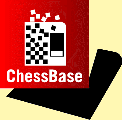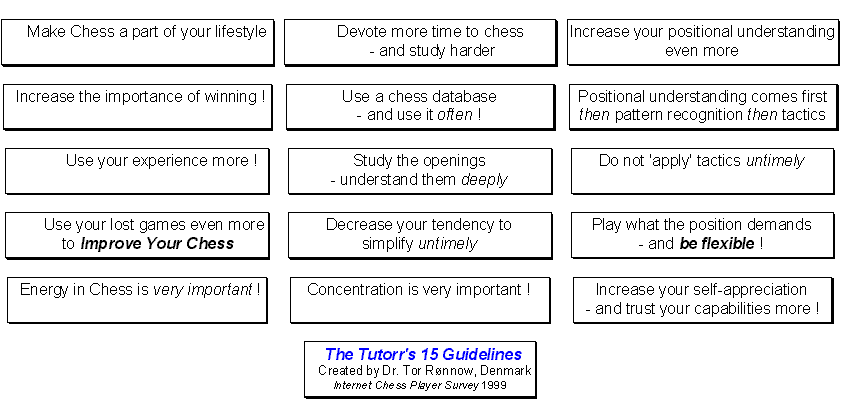|
| |
Torr
on Survey
Part 8. The Tutorr's 15 Guidelines
|
[The
survey form] [1. The Mission] [2. Use a
Database !] [3. Devote Yourself !] [4. Sour Losers] [5. Flexible concentration] [6. Holistic Chess] [7. Why move at all ?] [8. The Tutorr's 15 Guidelines] [9. Feedback page] [10. Downloads]
The Tutorr's 15 Guidelines for Improving Your Chess
The data from the chessplayer survey have been
presented in the preceeding seven articles. The articles have presented 15 expert
habits, 15 issues in which very strong players differ from weaker ones. In
conclusion, these expert habits should be regarded as pointers for how you may
improve your chess, yes, they should provide you inspiration and
motivation for your future work and goal-setting. Why ? Because the habits
reflect the beliefs and values and skills which the experts, the very strong chessplayers,
have. Your goal could be to copy them and to model
them.
Now, imagine in your mind that we extract the 15 habits of the experts and
transform them into 15 useful guidelines for improving your chess. These
are presented all together in the diagram below. Some readers will prefer to print
this page right away.
You
can pretend anything and master it !
Milton Erickson |
|
 |
Clickable map:
click on a habit to see the data from the survey (opens in a new window). Optimal screen resolution: 1024 * 768 pixels
Which guidelines apply to you ?
You may consider, now, which guidelines
that inspire your current state of chessmind the most. Surely, I don't know which
guidelines you hold in your mind now, and I don't know when you're going
to apply them, where or against whom you're going to apply them, but my
bet is that as you think about it now something in your unconscious
have changed. And the funny thing is, your conscious mind don't even have
the slightest idea what it is, all for the better. Spooky stuff, ehh ? How do you
feel, now, about your next game of chess ?
You can model ! - you have always done so
How did you ever learn to ride a bycycle ? How did you
ever learn to read and write, to speak foreign languages, to ...all the things you do ?
You modeled someone ! You modeled your parents, your teachers, your mates. You saw and
noticed what they did and you copied it...and copied it...until you mastered the skill and
then developed your own personal style. You can model any human behaviour if you can
master the beliefs, the specific thought processes and the physiology that lie behind it. So you can easily model a
chess expert too...and it may be a very useful way for you to improve your chess. I think you know.
It's an idea...and you can consider it, can you not ?
Final remarks
The world is always richer than the ideas we have about it. However, if you use
the guidelines and the concept of playing holistic
chess and let your chess step into the world of modeling, you may not only improve your chess but also expand your
current awareness. Why ? Because modeling is the process that makes excellence
explicit. And what you will experience is the peak experience of excellence yourself.
Best wishes !
|
Just one thing
If you wish to download and study the original data (Excel-files) from the
chessplayer survey or you wish to download this entire series of articles, please go to
the download page.You will be send to the download page after you have filed the
evaluation scheme. Please file the scheme !I appreciate very much that
you give your feedback ! |

|
Disclaimer
The data presented here and in the following articles can be analyzed
and concluded upon in many ways (remember that the survey was
scored on-line, and that the data may not be representative of
all chessplayers alike). The conclusions presented here are mine
entirely. Feel free to disagree, to have your own interpretations
and to impove your chess in the manner that suits you. The full
material of data will be published in the last article of this
series. If you have questions prior to this, or other comments,
feel free to mail me on torr@privat.dk
Copyright
The contents on this page (graphical, textual) may not be reproduced
without permission from the author. On citations or similar use,
please credit the author Dr. Tor Rønnow, Denmark (mail:
torr@mobilixnet.dk). |
|


